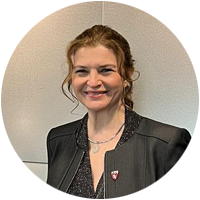Miriam S. Teixeira, MD, PhD | Global Clinical Scholars Research Training

Miriam S. Teixeira, MD, PhD, is the graduate medical education research director at Arnot Ogden Medical Center in Elmira, New York, as well as an ear, nose, and throat (ENT) specialist.
Originally from Brazil, Teixeira received her postgraduate degrees from the Universidade Federal de São Paulo, one of the largest training institutions in the country. While pursuing her PhD, she came to the United States to work in the Division of Medical Genetics and Genomic Science at the Mount Sinai Hospital in New York, applying her ENT expertise to research a new tumor suppressor gene in head and neck cancer.
New York to Pittsburgh to Boston
Following her time at Mount Sinai, Teixeira did a two-year research fellowship in the Department of Otolaryngology at the University of Pittsburgh, where she studied middle ear diseases and Eustachian tube dysfunction. Eventually, she was brought on as a research assistant professor, where she stayed until her lab was forced to shut down during the COVID-19 pandemic. Facing an inevitable career change, she chose to enroll in the Global Clinical Scholars Research Training (GCSRT) program at Harvard Medical School.
“The GCSRT program offered the tools I needed to diversify my portfolio, deepen my knowledge in clinical research, and consequently open more doors for future work positions. It could be a job in a pharma company where I could work remotely or maybe another job in academia that I could feed into,” she says. “For me, the most attractive part of the GCSRT curriculum was biostatistics because that was my main weakness.”
Teixeira was also intrigued by the program’s blended learning model, which includes interactive webinars, live virtual seminars, in-person workshops, and a capstone project based on an original research question.
Introducing a New Protocol
Teixeira’s capstone project focused on her experience testing patients with Eustachian tube dysfunction and chronic middle ear disease in the Middle Ear Physiology Laboratory at the University of Pittsburgh.
“My capstone proposes a new simplified protocol to test Eustachian tube dysfunction in children using a regular tympanometer, a machine widely available in otology and ENT clinics. The protocol is fast and children would be tested during routine clinic visits to avoid missing extra school days. The new protocol could inform clinicians about the type and severity of Eustachian tube dysfunction and help in the clinical management of these patients.”
Teixeira’s capstone proposal was ranked in the top ten of her Global Clinical Scholars Research Training class by a faculty panel. She hopes that it will be implemented in otology and ENT clinics in the near future.
Using Global Clinical Scholars Research Training to Educate
Midway through the Global Clinical Scholars Research Training program, Teixeira transitioned to her current role as graduate medical education research director at the Arnot Ogden Medical Center, where she immediately put her newfound skills and knowledge to work.
“Suddenly, I was a member of an institutional review board, running a research coordinator program and teaching students how to design a study, write a study proposal, and think about biostatistics from the beginning to the end. I immediately started to apply all the concepts I was learning to my new work,” she says.
“I redesigned the whole program to make it more efficient in terms of not only providing students with better clinical research training but also increasing productivity by getting their studies finished and published.”
Reflecting on her experience, Teixeira says that the best assets of Global Clinical Scholars Research Training are the faculty, the design of the program, and the global network.
“The faculty approach and the lecture format are fantastic. GCSRT is designed to give you a full view of what successful research is and the importance of working as a team. It provided an excellent opportunity to network and collaborate with researchers from different backgrounds and all parts of the world.”
Teixeira also appreciates the many ways in which both Harvard and the Global Clinical Scholars Training faculty continue to facilitate these friendships and collaborations after graduation.
“GCSRT graduates are invited to join the alumni association and return to the Harvard campus to participate in summits. That’s another great opportunity to not only reconnect with your colleagues and professors but also meet alumni from other Harvard postgraduate programs.”